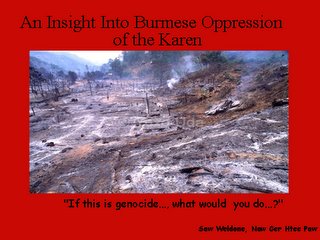Sustainability is composed into two inseparable, interrelated parts – ecological and social. We cannot have one without the other. The first 3 Sustainability Principles deal with the former, and the 4th with the latter. The systematic undermining of people’s capacity to meet their needs comes in many forms – and stems in one way or another from abuses of power, whether it be economic, political or environmental. It can be subtle and removed or blatant and direct.
The most horrific violations of the 4th Principle come in the form of dictatorships and genocide. A systems perspective is vital in looking at these terrible situations, as the contexts, historical events, direct and indirect impacts of globalization, etc all play into the equation. There are no easy answers, but awareness is certainly a prerequisite for understanding and action.
To that end, I wanted to offer some information on a terrible situation that I was just recently made aware of by a friend of mine here from
Here is a link to a concise paper he wrote on the subject that gives a good overview of the situation. For more information check out these links:
Karen Humans Rights Group - http://www.khrg.org/index.html
Free Burma - http://www.ibiblio.org/freeburma/
KarenPeople.og - http://www.karenpeople.org/
A couple of important things to remember in terms of human rights issues and sustainability –
First, diversity is an inherent characteristic of living systems (all systems in nature, including global human society). A system lacking diversity, lacks resilience, (whether you’re talking about farming systems, stock portfolios or global society), and is therefore more vulnerable to outside pressures (e.g. a drought, a market crash, climate change). So whether it's through the atrocities of genocide or the seemingly benign spread of a homogenous form of Western ‘culture’, the loss of heritage, language, tradition anywhere is a serious problem for us all, everywhere.
Second, as we are each individuals in society in the biosphere, we each contribute to the current unsustainable reality, and are interconnected (another inherent characteristic of complex systems), no matter how far away and separate these events may seem. And as such, we cannot externalize responsibility for them -
To end on a positive note, it is inspiring to see the dedication and commitment of people like Weldone, who are working to bring peace and justice to these areas. As he said, “I am just a small person, need more help from others.” We all have a vested interest to do just that. Stay going.

1 comment:
I've never even heard of these people! Also know next to nothing about Burma..keep chipping away!
Post a Comment